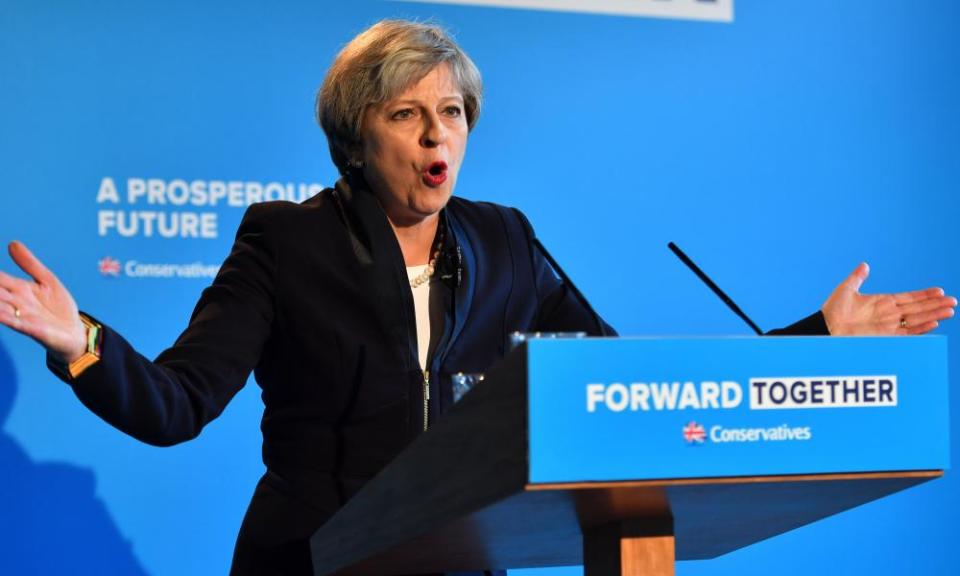From tax to Brexit, the Tories will do anything to stay in power

Jeremy Corbyn may score badly with the wider public, but for as long as I can remember the press have given even the most admired Labour leaders a hard time during election campaigns. A recent exception was Tony Blair, who – for a time – achieved rock star status with the media.
Many reports have suggested that when presented with individual Labour policies – in what one might call a “blind tasting” – respondents have been much more enthusiastic than when the names of Corbyn and some of his colleagues come up.
One peculiarity of this campaign is that policies such as caps on the charges made by energy suppliers were derided by the Conservatives when propagated by Corbyn’s predecessor, Ed Miliband, but have now been brazenly filched by Theresa May. This is in accordance with the first law of Conservative dynamics: do anything to stay in, or regain, power.
However, I did not get where I am today by going into every detail of political manifestos. What I find interesting about the broad thrust of the manifestos of both main parties is that, in their own way, the Conservatives and Labour are slowly abandoning the pretence that we can have Scandinavian levels of public service with US levels of taxation.
I am not sure that this applies to the lunatic fringe of Tory Brexiters. They want to turn this country into a low-tax, Singapore-style entrepreneurial fantasy. (In my experience, these people have no idea of the history of Singapore, let alone how state-controlled it actually is.)
In the past Labour has tied itself in knots with commitments ruling out increases in principal tax rates, resorting to all manner of subterfuge instead. The Tories have been no better. In which context, younger readers may be amused to learn that, during the 1979 election, there were persistent rumours that the Tories planned to double the rate of VAT from 8% to 16%. These were strenuously denied. Guess what? When they came in, they raised it to 15%.
When May stated on 30 April that “we have absolutely no plans to increase the level of tax” it was time to start counting the spoons. It reminded some of us of George Bush Sr’s remark: “Read my lips. No new taxes.”
Bush’s words were widely misinterpreted: in fact, they left ample scope for raising the level of existing tax rates. In May’s case, the sceptical listener will have rightly thought: “Ah, yes. No plans until after the election.”
May went on: “We don’t want to make specific proposals on taxes unless I’m absolutely sure that I can deliver on those.” Note what journalists tend to call the “vertical pronoun”: that regal “I”. No wonder there has been intense speculation about the chancellor’s future. Philip Hammond had made the point that running the economy demanded flexibility in tax policy. He knew all too well that the practice of ruling out increases in specific tax rates restricted the Treasury’s room for manoeuvre. He seems to have made his point, but May is by all accounts someone who bears grudges.
Tory chancellors have a habit of falling out with their prime ministers. Nigel Lawson fell out with Mrs Thatcher. Norman Lamont fell out with John Major. George Osborne fell out with May many times when she was home secretary but did not get the chance to confront her over policy when she became prime minister because she sacked him on day one.
Didn’t get a chance as chancellor, that is. As editor of the London Evening Standard, he falls out with May almost daily. Although he did not stand up against the very idea of that stupid referendum on Brexit when in cabinet, he is doing his best to atone for it now.
In an unsigned editorial last week Osborne revealed that no one else in the cabinet, not even the extreme Brexiters, agreed with May’s manifesto aim to reduce net immigration to “tens of thousands”. For Osborne, this policy is not only unachievable but also “economically illiterate”.
Quite right. When one considers the needs of the health service, education, research institutes and hosts of businesses, it is insane – but, I fear, all too typical of the absurdity and self-harm of the whole Brexit venture.
It is depressing to hear there are people who say they voted Remain but who now say “we might as well get on with it”. Get on with heading for the economic cliff? Are they men, women or mice? We should be told.
Meanwhile, as leader of what has become the Conservative and Ukip party, May continues to pursue net immigration targets that she failed to achieve during all those years as home secretary. In a perceptive review of a recent biography of May, the writer David Runciman warned us that her main object as prime minister is to concentrate on this chimera of drastic cuts in immigration. It is utterly shameful that she is thus prepared – in her chancellor’s words before article 50 was invoked – to make the country poorer by sacrificing our membership of the European customs union and the single market.
The irony is that, however sincere she may be in wanting to change the “nasty party” into a more caring government, the impact of Brexit on the nation’s finances will almost certainly frustrate her ambition. It will aggravate the ills of an economy that is already experiencing stagnant incomes and the continuing effects of a misconceived austerity policy.
Finally, I note that the Brexiters, and others, are seizing on any emollient statement from Michel Barnier, the chief negotiator on the other side. Well, I wonder. President de Gaulle made it difficult for us to join the EU and the French and the others are unlikely to make it painless for us to leave.
Will this country ever wake up?

 Yahoo Finance
Yahoo Finance 